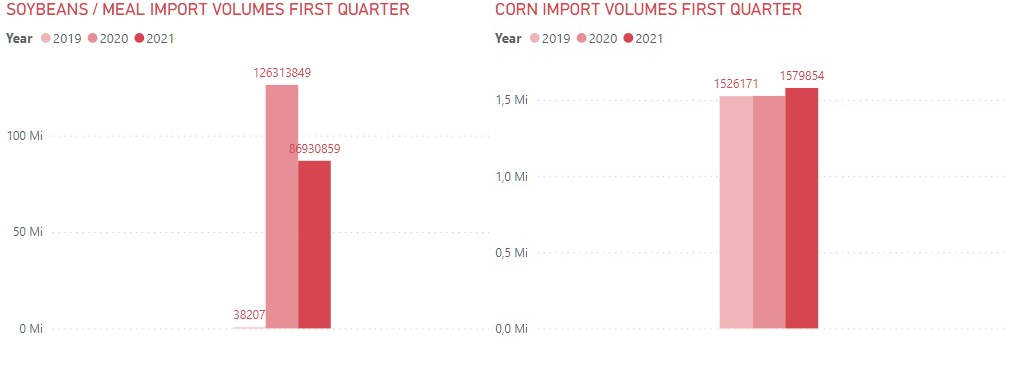
Brazil exempts grain imports from tax
Apr, 22, 2021 Posted by Ruth HollardWeek 202117
The executive management committee (GECEX) of the foreign trade chamber (CAMEX), decided to zero the Common External Tariff (TEC) for the import of corn and soybeans and derivatives from countries outside of Mercosur by the end of this year. The objective is to guarantee the internal supply and competitiveness of the Brazilian meat segment, which faces a substantial increase in costs due to the high prices of these grains, which are essential inputs for poultry and pork feed.
“We are analyzing several ways to contribute to the competitiveness of the meat sector in Brazil during a scenario of price pressure. This will ensure a steady performance of the chain and domestic supply at affordable costs,” said the Deputy Secretary of Commerce and International Relations of the Ministry of Agriculture, Flávio Bettarello.
GECEX is suspending the 8% tariff on soybean and corn imports, 10% tariff on soybean oil imports, and 6% tariff on flour and pellet imports.
DataLiner data shows that soybean / soymeal vessels importing grain into Brazil have increased dramatically over the last two years. Corn imports are much higher and have also increased this quarter compared to previous quarters.

Source: DataLiner (click here to request a demo).
The exemption will take effect seven days after the publication of the GECEX resolution. It will be valid for imports of corn grains and soybeans (even crushed) and will also apply to the oil, bran, and pellets of the oilseed. Maximum purchase quotas have not been established. The decision was taken at an extraordinary meeting held yesterday.
In October last year, CAMEX had already zeroed TEC for imports of soy and corn. The deadlines expired on January 15 for soybeans and derivatives and on March 31 for corn. The expectation was that foreign prices would stabilize and that the harvest of the summer harvest would help to rebalance the market, mainly for the sector.
Even with record soybean and corn harvests in this 2020/21 season, domestic prices continued to rise because of strong external demand and the continuation of the devaluation of the real against the dollar.
The Brazilian Animal Protein Association (ABPA), which represents large companies such as BRF and Seara (JBS), applauded the decision. The entity had already requested the extension of the exemption to the Ministry of Agriculture earlier this month.
“We think it is an important alternative to end the inflationary and speculative pressure that was happening [in the market],” commented Ricardo Santin, president of ABPA.
Santin welcomes the expanded range of sources for industry purchases. According to him, the companies are already waiting for the arrival of two ships importing corn from Argentina in the next few days and believe that more imports will come – now also from other major world producers.
The ESALQ / BM & FBovespa indicator for a 60-kilo bag of corn reached R$ 97.91 yesterday, up 90% in the last 12 months and a new record high. According to the Center for Advanced Studies in Applied Economics (CEPEA), sellers are already asking for more than R$ 100. The CEPEA/ESALQ indicator for a bag of soybeans traded in the interior of Paraná once again surpassed the R$ 172 barrier, appreciating 81% in 12 months and coming very close to the maximum of R$ 172.66 recorded on April 14.
-
Ports and Terminals
Jun, 13, 2024
0
Businesses push for Port of Santos urgent expansion
-
Ports and Terminals
Mar, 23, 2021
0
ANTAQ approves simplified tariff at Imbituba
-
Shipping
Aug, 21, 2023
0
Panama Canal has biggest traffic jam of the seas with over 200 ship backlogs
-
Ports and Terminals
Sep, 02, 2022
0
Port of Itajaí stopgap lease solution barred in the courts

